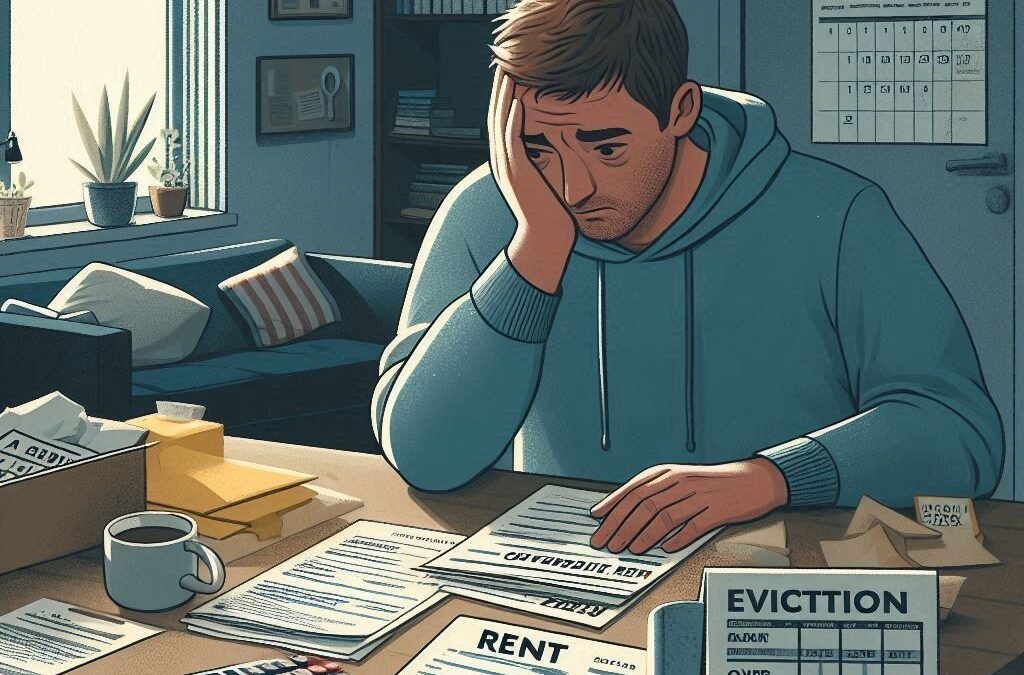Dealing with debt can indeed be very stressful but avoiding it can lead to life-changing situations. Acting swiftly and contacting your landlord sooner rather than later can make a significant difference. Dealing with rent arrears is crucial for several reasons. Firstly, it helps prevent misunderstandings with your landlord and shows that you are taking responsibility for your financial situation If you do not address your rent arrears, your landlord may apply to the court to repossess your home. This can lead to eviction proceedings, which can be stressful and disruptive.
Additionally, managing your rent arrears can help you avoid further financial strain. Proposing a realistic repayment plan to your landlord can make the payments more affordable based on your current income and expenses. Seeking professional debt advice can also help you manage your debts more effectively and understand your options..
Taking these steps can help you manage your rent arrears effectively and avoid the negative consequences of falling behind on your payments.
What to do if you are in arrears of rent:
A Section 8 notice is used by landlords to seek possession of a property when a tenant has breached the terms of their tenancy agreement, such as falling into rent arrears. Here is a brief overview of the process. It is important to remember that if you are in rent arrears, the landlord may be able to apply to court to repossess your home! Below are the grounds the landlord may use.
- There are various grounds for possession: For rent arrears, landlords will normally use grounds 8, 10, and 11:
- Ground 8: If you owe at least 2 months' rent.
- Ground 10: If you owe some rent.
- Ground 11: If you have consistently paid rent late¹.
- Notice Period: The landlord must give you a notice period, which can range from 2 weeks to 2 months, depending on the specific grounds used.
- Court Action: If you do not pay the arrears or leave the property by the end of the notice period, the landlord can apply to the court for a possession order.
Below are resources that you may find useful:
(1) What is a section 8 notice? - Shelter England. https://england.shelter.org.uk/housing_advice/eviction/eviction_after_a_section_8_notice.
(2) Evicting tenants in England: Section 21 and Section 8 notices - GOV.UK. https://www.gov.uk/evicting-tenants/section-21-and-section-8-notices.
(3) Universal Credit: Landlord request for a managed payment or rent .... https://www.gov.uk/government/publications/universal-credit-landlord-request-for-a-managed-payment-or-rent-arrears-deduction.
(4) Private renting: Rent arrears - GOV.UK. https://www.gov.uk/private-renting/rent-arrears.
WHAT SHOULD YOU DO IF YOU ARE IN ARREARS OF RENT
- Contact Your Landlord AS SOON AS POSSIBLE:
- Why: Keeping your landlord informed can prevent misunderstandings and show that you are taking responsibility and trying to repay your arrears.
- How: Write a letter or email explaining your situation and propose a plan for repaying the arrears. Be honest about your financial situation. You can use the link below to access a template letter.
- https://debt2day3tomorrow.com/rent-arrears-repayment-letter/
- Check Your Benefits:
- Why: You might be eligible for financial support that can help cover your rent.
- How: Use online calculators like the Turn2us Benefits Calculator or entitled to Benefits Calculator - entitledto - independent | accurate | reliable website to check your eligibility for benefits such as Housing Benefit or Universal Credit.
- Breathing Space Scheme:
In England and Wales, “Breathing Space” is a government scheme that provides temporary protection from most types of debt collection while you take action to get on top of your debts.
There is also the Mental Health Crisis Breathing Space: This is a special version of the scheme for those receiving mental health crisis treatment. It offers similar protections but lasts as long as the treatment plus an additional 30 days.
-
- Why: These schemes provide temporary relief from debt-related pressure.
- How: Apply through a debt advice provider like Citizens Advice . They will assess your situation and, if eligible, you will get 60 days of protection from creditors.
- Seek Debt Advice:
- Why: Professional advice can help you manage your debts more effectively.
- How: Contact organisations like Citizens Advice or Shelter Eviction for rent arrears - Shelter England for free, confidential advice. They can help you understand your options and negotiate with your landlord.
- Legal Advice:
- Why: If eviction proceedings start, legal advice can help you understand your rights and options.
- How: Look for free legal advice services in your area, such as Law Centres
- Payment Plan:
- Why: A manageable repayment plan can help you clear arrears without causing further financial strain.
- How: Propose a realistic payment plan to your landlord. Make sure the payments are affordable based on your current income and expenses. It is good practice to include a copy of your income and expenditure when submitting your repayment proposals.
If you are a Council tenant
The Housing Act 1985 outlines the regulations governing secure tenancies, which are residential tenancy agreements utilized by local authorities for their own properties.
When local authorities intend to repossess a property under section 83 of the Act, they are required to issue a notice to the tenant using a specific document known as a 'prescribed form.' This form is meticulously designed to ensure that both the person completing it, and the recipient fully comprehend the proposed actions and the necessary steps to take in response. If the appropriate form is not used, the proposed action may be deemed invalid.
What is a secure tenancy?
A secure tenancy is a type of residential tenancy agreement typically used by local authorities and housing associations in the UK. It provides tenants with a high level of security and protection. Under a secure tenancy, tenants have the right to remain in their home if they comply with the terms of the tenancy agreement, such as paying rent and not engaging in anti-social behaviour.
Secure tenants also have specific rights, including:
- The right to repair essential issues in the property.
- The right to pass on the tenancy to a family member in certain circumstances.
- The right to exchange their home with another council or housing association tenant.
This type of tenancy ensures stability and safeguards tenants against arbitrary eviction, making it quite different from some private rental agreements.


1 Comment
Very interesting article.